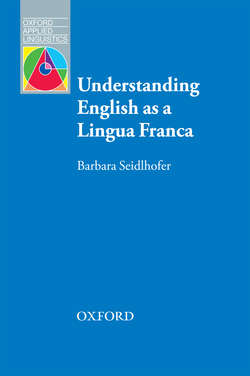Читать книгу Understanding English as a Lingua Franca - Barbara Seidlhofer - Страница 3
На сайте Литреса книга снята с продажи.
Acknowledgements
ОглавлениеOver the years of writing this book, I have been fortunate in receiving help and encouragement from many friends and colleagues.
When I first put the idea for this book to Cristina Whitecross a decade ago, she saw the point immediately and she has given the project continuous support ever since. I have also greatly benefited from her expert editorial advice in getting this book into shape for publication. My thanks, too, to the OUP team, particularly Julia Bell and Ann Hunter, who sensitively shepherded the book through its last phase of copy-editing and production, and to Nora Dorn, who perceptively prepared the index.
Several readers have given me valuable feedback on the whole manuscript or parts of it and so helped me to improve the text. I would like to thank Janina Brutt-Griffler, Sandy McKay, Anne Burns, as well as an anonymous reviewer for their time and expertise. Jennifer Jenkins not only generously commented on the manuscript in its original and revised versions but has also been an ever-dependable source of information and encouragement, and a partner in spirited debates over many years. It has been a great pleasure to see Jennifer’s and my own research students getting to know each other; together with those of Anna Mauranen. A new generation of scholars including Martin Dewey, Alessia Cogo, Elina Ranta, Susanne Ehrenreich, Beyza Björkman, Jagdish Kaur, and several others are demonstrating that the study of ELF continues to thrive and to attract sharp and inquisitive minds.
Among the researchers who have made a particularly significant contribution to ELF studies are my colleagues here in Vienna, where they provide a highly inspiring and mutually supportive environment. Marie-Luise Pitzl, Angelika Breiteneder, and Stefan Majewski were in at the very beginning of the VOICE project, and they and the other ‘Voices’ – Theresa Klimpfinger, Ruth Osimk, and Michael Radeka – have been a pleasure to work with, both individually as researchers and as an incredible team, helped by a number of able assistants. Most of them have also given me constructive feedback on different chapters. Cornelia Hülmbauer, my co-researcher on the DYLAN project, as well as Kathrin Kordon, Julia Lichtkoppler, Heike Böhringer, Anita Wolfartsberger, and Claudio Schekulin have all given me their support, too, as have several other doctoral and MA students, through the expertise and enthusiasm with which they also conduct their own research on ELF.
Further afield, several researchers who have shared an interest in ELF for quite some time have, of course, contributed to my thinking, in particular Juliane House, Karlfried Knapp, Kurt Kohn, Andy Kirkpatrick, Robin Walker, Maria Grazia Guido, Alan Firth, Christiane Meierkord, and the late Werner Hüllen. Other colleagues have supported me by their openness and willingness to engage with ELF issues from the perspective of their own complementary areas of interest and expertise. These include Ulrich Ammon, Suresh Canagarajah, Ron Carter, Guy Cook, Jim Cummins, Zoltan Dörnyei, Gibson Ferguson, Susan Gal, Saran Kaur Gill, Claus Gnutzmann, David Graddol, Matthias Hüning, Ken Hyland, Frauke Intemann, Friederike Klippel, Claire Kramsch, Diane Larsen-Freeman, Georges Lüdi, Tim McNamara, Marko Modiano, Lorenza Mondada, Kumiko Murata, Daniel Perrin, Edgar Schneider, Barbara Soukup, Arturo Tosi, Sue Wright, Yasu Yano, my colleagues in all the DYLAN teams – and two outstanding scholars, no longer with us and much missed: Christopher Brumfit and Willis Edmondson.
I have also benefited from discussions, in conference rooms and around dinner tables, about various aspects of and perspectives on ELF with several colleagues and friends who tend to take a more sceptical view of ELF, especially Peter Trudgill, Michael Swan, and Robert Phillipson. The views of Braj Kachru and Randolph Quirk have been a stimulating challenge and have helped me to clarify my own understanding of ELF.
I would also like to thank Guy Aston, Vicki Hollett, and Leo van Lier for advice on specific issues, and Moira Runcie and Barnaby Newbolt for their trust in offering additional financial support through OUP for the VOICE project.
By far the greatest debt I owe to the person to whom this book is dedicated – and who will be as happy as I am that it is finally going into print!
In various parts of this book, I have drawn on papers in which I discussed ideas I also deal with here, mainly Seidlhofer 2001, 2002, 2003a, 2005, 2007, 2009a, 2009c, Seidlhofer and Widdowson 2009, and Widdowson and Seidlhofer 2003.
The authors and publisher are grateful to those who have given permission to reproduce the following extracts and adaptations of copyright material:
p. 30 Extract from ‘It just isn’t English’ by Derwent May’ The Times, 24 March 2000 © Derwent May, NI Syndication Limited, 2000. Reproduced by permission.
p. 152 Extract from The Shape of Things to Come by H. G. Wells. Reproduced by permission of A P Watt Ltd.
p. 155 From Nineteen Eighty-Four by George Orwell (Copyright © George Orwell, 1949) by permission of Bill Hamilton as the Literary Executor of the Estate of the Late Sonia Brownell Orwell and Secker & Warburg Ltd. Copyright 1949 by Harcourt, Inc. (in the US) and renewed 1977 by Sonia Brownwell Orwell. Reprinted by permission of the publisher.
